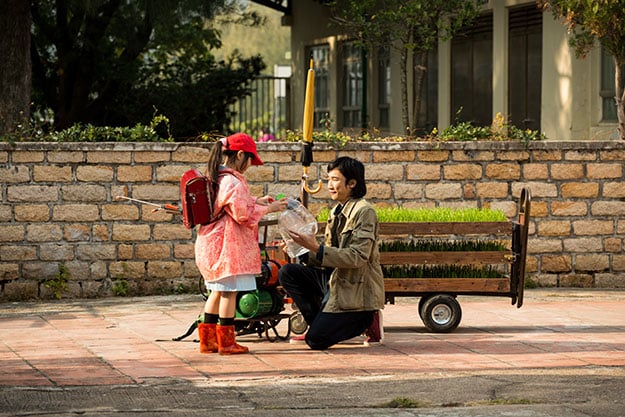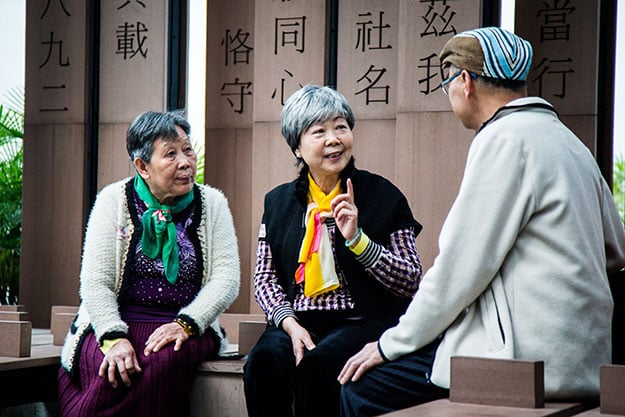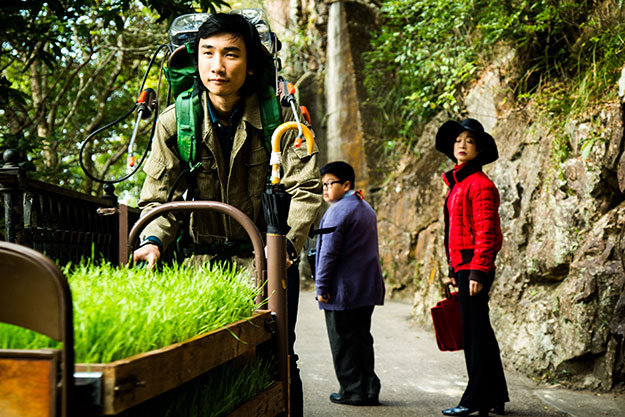Film of the Week: Hong Kong Trilogy

The English subtitles at the end of Christopher Doyle’s Hong Kong Trilogy tell us that the people we’ve just met are real Hong Kong people “sharing their DREAMS” before signing off, “Thanks for taking the time to LISTEN UP.” Wouldn’t it be nice if more films were so charmingly gracious? Doyle’s trilogy certainly has charm, which to a degree makes up for a sometimes frustrating sketchiness in terms of substance. The film—three linked semi-documentary vignettes about a location close to the director’s heart—feels as much a community project as a personal statement. It isn’t so much an example of the genre known as the “city symphony”—it’s more like a city jam.
Star cinematographer Doyle is known, among other things, for helping give modern Hong Kong a prominent place on the map of the contemporary cinematic imagination, notably in his chromatically supercharged contributions to Wong Kar Wai’s Chungking Express (1994) and Fallen Angels (1995). The Hong Kong of those films is a glamorous landscape of neon, neo-noir, and bustling malls (the Asian city food market has become, in modern screen mythology, something like the privileged place of dreams that the old arcades of Paris were for the Surrealists). The city of Doyle’s trilogy, by contrast, is demystified, revealed in daylight as a place where ordinary people get on with their ordinary lives—although the film’s argument is perhaps that these are really extraordinary people living extraordinary lives.
First shown in 2015, the film is in three parts, each dealing with a separate subject. “Preschooled” is about everyday life at a Hong Kong school, with captions taking us through the day (“7.45 a.m.”—yes, they start early) and giving us the voiceover thoughts of pupils of various ages. “Preoccupied,” the most straightforwardly documentary section of the three, covers the 2014 street occupations by students and other protestors, associated with what came to be called Hong Kong’s “Umbrella Movement.” And part three, “Preposterous,” shows a group of senior citizens, the Preposterous Seniors (are they really called this, or is Doyle just having fun with his prefixes?), on a day out including a speed dating party on a city tram.

The three episodes are documentary only insofar as they show real people and record their—presumably unscripted—voiceover confidences. Presumably the teenager known as Pet Shop Boy really does prefer to spend his time gazing at the scarlet flamingos in an enclosure—“It’s cool to chill with you guys”—rather than hang out with his schoolmates. And presumably the tubby, bespectacled boy known as Vodka Wong really has beaten up other kids and really regrets the (perhaps not unrelated) fact that his parents are away much of the time. And presumably too, when we meet Vodka’s mother—a rather ridiculous figure in a flamboyantly floppy hat—we can be sure that it really is her, and that she’s been persuaded to send herself up in some of the goofy comic episodes that Doyle has staged here.
We can’t be certain of any of this; what we can be fairly sure of, however, is that everyone involved looks like they’re having a lot of fun. The same characters—I think it’s fair to call them “characters,” because they all become at least semi-fictional—wander through all three parts, and at the end of the film, a whole crowd of them wind up at a very jolly party by the sea. In a sense, the film is itself a very jolly party, and whether you enjoy it or not—at times, you certainly get that awkward party feeling that everyone else is having more fun than you are—you can’t help appreciating Doyle’s hospitality in inviting you to join in.
In “Preschooled”—which could more accurately just have been called “Schooled”—we visit a school that looks more from the outside like a large housing block, with bright blue walls and railings that form this section’s visual theme. As the times of day flash up on screen, and we hear the off-screen voices of the pupils, we almost expect a straight documentary about the inner life of schoolchildren, or something like a Chinese To Be and To Have. Doyle does sometimes takes us into the school corridors, but he’s not interested in classroom time, more in the people he meets. One is a young female teacher called Selene, another is a young man known as Beat Box who’s desperately in love with her, and who follows her around doing vocal beatboxing and serenading her with a bespoke rap: “These days it’s hard to be a good teacher…” Then there’s an eccentric small girl called Ching Man, a.k.a. Little Red Cap (many of these people are given oddball nicknames). Ching Man has a thing about deities, any deities: she’s forever handing out pictures of them to her classmates; has her own shrine to Buddha, Jesus, the Virgin Mary, the elephant god Ganesh, you name it; and likes to lug around big plastic tanks of holy water with which she occasionally sprinkles anything and anyone that takes her fancy. You wonder whether Ching Man really has this religious fixation, and whether Doyle is indulging her by milking it for comic value (although he’s absolutely not laughing at her expense).

Part two, “Preoccupied,” is largely about the Umbrella Movement, so-called because protestors would use umbrellas for shelter and to defend themselves against police, before these objects took on a symbolic meaning; one overtly poetic, not to say precious, VFX shot has a whole cloud of tiny umbrellas float magically upwards. This section partly offers reportage images of the occupation and the people involved, although Doyle perhaps undersells the meaning of the protest with captions that tell us that in September 2014, idealistic people occupied parts of the city “to give all some space to think”—suggesting a vague utopian notion that rather obscures the call for free elections and the manifestation of defiance towards the city police.
Again, Doyle is less interested in the facts or the social circumstances than in his encounters with curious people—although at the end of this section, when police clear the occupation, we see a speaker call for continued civil disobedience, followed by striking shots of the now cleared Harcourt Road, looking bathetically drab (Doyle loves a party, deplores the quiet after the party’s moved on). But even this second section is primarily about eccentrics on the sidelines, rather than necessarily involved in the main political action. There’s an arty-looking young woman with bobbed hair, a feng shui specialist named Thierry, who muses on changing one’s fate, bucking predestination, learning from the past; there’s a young man who wheels a trolley of fresh wheatgrass in and out of the action; and there’s a man who runs an unlicensed, vaguely pop-up venue called Senses (“This place is more a mental hospital than a bar”) where Beat Box gets to jam with the young musicians who play the gently baggy folk-jazz groove that’s the score for much of this chapter.
Then the clowning begins: a lanky, leather-jacketed man named Kevin gets his hands on Senses’ beer when it’s confiscated by the police, only to lose it to other more resourceful freebooters. Kevin—who later turns up as a teacher escorting a class of kids on a tram outing—is played by Kevin Sherlock, a Doyle lookalike more or less, who I remember as one of the goofy bohemians that populated Doyle’s teeth-grindingly eccentric 1999 feature Away With Words. Here, Doyle has somewhat reined in Sherlock—as well as the lurid visual tendencies of that film—but still, things get out of hand in a bizarre non sequitur of a skit set at a police station, involving Vodka’s arrest for littering, a man lounging in a bathtub and Kevin begging the cops in English to “Keep me roped in your submission” (sic).

Things get cozier in part three, where an elderly cast head out for a day’s hijinks. Once again, Doyle seems to avoid the things we’d really like to know about. He has fun with a chanteuse singing traditional Chinese songs on a tram and getting booed by Kevin’s class of kids, but manages to miss everything that’s interesting about a venerable woman named Lady Swim, who recalls how she once swam to Hong Kong from China, with soldiers in pursuit; she’s apparently referring to the exodus from mainland China between the 1950s and ‘70s, but it would have been nice if Doyle had nudged her to reveal a little more specific detail. Instead, we get a briefly glimpsed gallery of elderly speed daters, a stop-off at a mini-golf course, and an addled Kevin popping in and out in search of beer. Everything ends up at the beach, with Red Cap Girl splashing the holy water and a final mass sing-along (“We’ll sing for freedom”) of utopian defiance.
It’s all a bit Magical Mystery Tour, this section—which takes us back to John Lennon, adopted (on one city wall, at least) as the presiding spirit of the Umbrella occupation. The film ends with titles quoting “Imagine”: “I hope some day you’ll join us…” Doyle says it all here: his Trilogy is a laid-back hippie reverie in the form of a come-as-you-are party. As a documentary, it doesn’t reveal a great deal about Hong Kong as a city, but it definitely expands the fictional picture that Doyle has in the past so memorably created as a cinematographer. Curiously, the Trilogy doesn’t leap off the screen as a beautifully shot piece of work—in my experience, films directed by DPs often don’t, because they have a tendency to dial down the stylistics so as not to come across as simply pictorial. But there’s a care and precision about the way the images are composed and assembled, and there’s lots of local life and geography here that I’ve never seen on film. Since Doyle’s Wong Kar Wai films have helped form the city’s image as a hotbed of sexy electric nerviness, it’s almost as if he’s redressing the balance—revealing that Hong Kong is also a place suitable for children, old people, utopian dreamers, and flamingos. Who knew?
Jonathan Romney is a contributing editor to Film Comment and writes its Film of the Week column. He is a member of the London Film Critics Circle.



